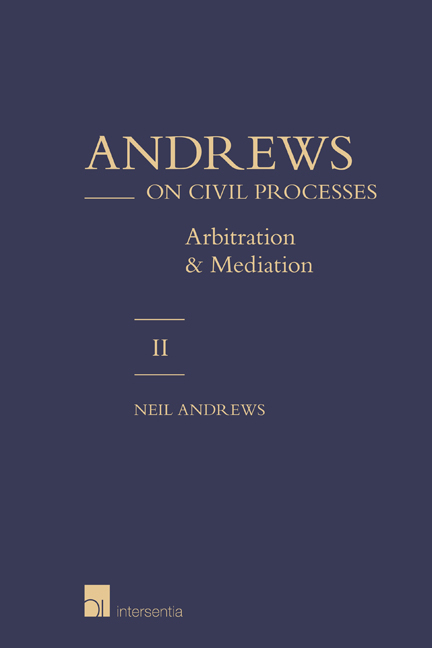Book contents
- Frontmatter
- Dedication
- CONTENTS VOLUME I
- Contents
- Table of Cases
- Table of Statutes
- Table of Statutory Instruments
- PART I MEDIATION
- PART II ARBITRATION
- Chapter 3 Commercial Arbitration: What Is It and Why Choose It?
- Chapter 4 The Major Principles of Arbitration and Litigation: A Comparison
- Chapter 5 Fundamental Features of English Arbitration
- Chapter 6 ‘The Seat’ and the Range of Relevant Laws
- Chapter 7 ‘Arbitrability’: Public Policy Limitations upon the Scope of Arbitration
- Chapter 8 A Confidential Process
- Chapter 9 Arbitration Agreements
- Chapter 10 Courts Giving Effect to Arbitration Agreements
- Chapter 11 Commencement of the Submission and Time Issues
- Chapter 12 The Tribunal's Appointment, Tenure and Immunity
- Chapter 13 Pre-Hearing Proceedings
- Chapter 14 The Hearing
- Chapter 15 Final Remedies, the Award, and Correction of the Award by the Tribunal
- Chapter 16 Fees, Expenses and Recoverable Costs
- Chapter 17 Arbitration Awards: Issues of Finality and Res Judicata
- Chapter 18 Challenges to English Arbitral Awards under English Law
- Chapter 19 English Enforcement of English Awards
- Chapter 20 Enforcement under the New York Convention (1958)
- PART III CONSUMER ADR
- Select Bibliography
- Index to Volumes I and II
Chapter 5 - Fundamental Features of English Arbitration
from PART II - ARBITRATION
Published online by Cambridge University Press: 13 December 2017
- Frontmatter
- Dedication
- CONTENTS VOLUME I
- Contents
- Table of Cases
- Table of Statutes
- Table of Statutory Instruments
- PART I MEDIATION
- PART II ARBITRATION
- Chapter 3 Commercial Arbitration: What Is It and Why Choose It?
- Chapter 4 The Major Principles of Arbitration and Litigation: A Comparison
- Chapter 5 Fundamental Features of English Arbitration
- Chapter 6 ‘The Seat’ and the Range of Relevant Laws
- Chapter 7 ‘Arbitrability’: Public Policy Limitations upon the Scope of Arbitration
- Chapter 8 A Confidential Process
- Chapter 9 Arbitration Agreements
- Chapter 10 Courts Giving Effect to Arbitration Agreements
- Chapter 11 Commencement of the Submission and Time Issues
- Chapter 12 The Tribunal's Appointment, Tenure and Immunity
- Chapter 13 Pre-Hearing Proceedings
- Chapter 14 The Hearing
- Chapter 15 Final Remedies, the Award, and Correction of the Award by the Tribunal
- Chapter 16 Fees, Expenses and Recoverable Costs
- Chapter 17 Arbitration Awards: Issues of Finality and Res Judicata
- Chapter 18 Challenges to English Arbitral Awards under English Law
- Chapter 19 English Enforcement of English Awards
- Chapter 20 Enforcement under the New York Convention (1958)
- PART III CONSUMER ADR
- Select Bibliography
- Index to Volumes I and II
Summary
GENESIS OF THE ENGLISH ARBITRATION ACT 1996
Arbitration in England substantially rests on the Arbitration Act 1996 (England and Wales). This statute reflects the sequence of topics in the UNCITRAL Model Law. However, the English Act covers a wider range of matters than the Model Law. The main deviation from the Model Law is section 69 of the Arbitration Act 1996, which permits appeals (subject to the High Court's permission) from awards where there is alleged to have been an error of English law: 18.67 ff.
The Court of Appeal in Cetelem SA v. Roust Holdings Ltd (2005: 13.18 to 13.21) noted that the Departmental Advisory Committee's report (notably the 1996 report) provides a valuable source of guidance when construing the Act, although the fact that a particular matter is not mentioned in that report does not prevent the court from deciding that this matter is in fact compatible with the Act.
The 2006 ‘Report on the Arbitration Act 1996 (England and Wales)’ reveals that the English legislation is perceived as effective. No changes were recommended.
MAIN ELEMENTS OF THE ENGLISH ARBITRATION ACT 1996
The five main elements are:
(i) respect for the parties’ freedom of contract in procedural matters;
(ii) the arbitral tribunal's duty to promote efficiency speediness, and fairness in the conduct of the submission;
(iii) the principle of procedural co-operation between the parties;
(iv) the minimalist role of the courts;
(v) judicial support and supervision.
These points will now be developed.
RESPECT FOR THE PARTIES’ FREEDOM OF CONTRACT IN PROCEDURAL MATTERS
The parties’ consensual autonomy (‘freedom of contract’) is a leading feature of the Act (as noted in section 1 of the Arbitration Act 1996 (England and Wales): the parties should be free to agree how their disputes are resolved, subject only to such safeguards as are necessary in the public interest). This freedom enables them to determine, or at least influence, how the repertoire of procedural measures should be applied in their particular case. Parties to arbitration can shape their ‘alternative’ to ordinary court procedure.
- Type
- Chapter
- Information
- Andrews on Civil ProcessesArbitration and Mediation, pp. 143 - 154Publisher: IntersentiaPrint publication year: 2013



